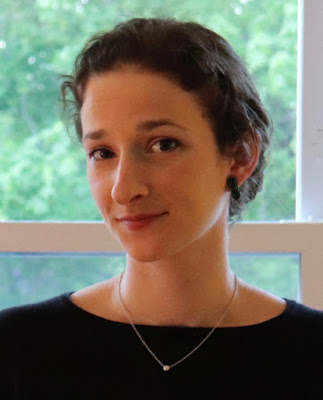Anna Hogeland
 |
| photo credit: Shelby Kinney-Lang |
Hogeland's new novel is The Long Answer.
My Q&A with the author:
How much work does your title do to take readers into the story?Visit Anna Hogeland's website.
My hope is that the title invites readers to wonder both, what is the long answer, and what is the question being asked? We rarely feel the space to really tell our stories in their entirety; as a therapist, I have a real honor of getting to hear the long answers, by which I mean the truer, more nuanced answers, to questions as simple as, how are you? When I began trying to conceive a child, I noticed that the stories of how people made families were greatly condensed, and I was desperate to know what those years were really like for people, so I might be better prepared for how they might be for me. This book is in part an attempt to provide those long answers both for myself and for any readers who also feel the absence of them in their own lives.
What's in a name?
I spend way too much time choosing character names! And the names of streets, restaurants, towns, and so on. I change them often during the writing process. Researching names is definitely a way to procrastinate on the “real” writing, but I also feel that a character’s name needs to feel very right to me before I can really inhabit them. So, to a reader, I don’t know that my character names will seem particularly significant, but to me as the writer, they each have the sound, connotation, and region of origin that feels most suited to the character.
Do you find it harder to write beginnings or endings? Which do you change more?
For this book, the beginning came very easily to me, at first. I wasn’t sure how it would end, because it mirrored my own life so closely, and I wasn’t sure how my own story would progress. A year into writing it, however, I knew my own arc better,and the ending presented itself without too much trouble. But I ended up working and reworking the first ten pages forever, trying to figure out the best way to organize the information, how to ease the readers into the story. Those first pages ended up being the ones I labored on the most.
Do you see much of yourself in your characters? Do they have any connection to your personality, or are they a world apart?
Since I write autofiction, I definitely share a lot in common with my protagonist (we even share the same name), but we are not the same person. She is a literary construct who lives in a book, and I am a human. I get to evolve past her, and move her around, which is an empowering feeling.
What non-literary inspirations have influenced your writing?
I am endlessly inspired by the stories I hear around me: stories from my family, friends, therapy clients, stories I overhear in restaurants. I am always looking for material that feels emotionally and relationally complicated, that moves in a way you wouldn’t expect–and if you are really listening to those around you, these stories are everywhere.
--Marshal Zeringue
